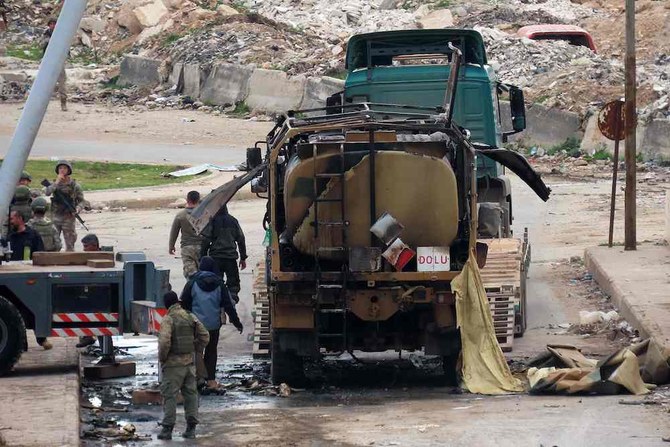ANKARA: Russian ballistic missile strikes in northern Syria on Monday in defiance of the cease-fire with Turkey in March 2020 could have broader repercussions, experts say.
The Russian attack from Kweyris base in regime-controlled Aleppo targeted oil refineries under Turkish control in northwestern Syria. It was the second such attack in nine days.
As Syria marks a decade of civil war, this region is considered vital for providing households, farmers, bakeries, and other businesses with oil.
The refineries here are used to refine about 40 percent of the crude oil that comes from the region controlled by the Syrian Kurdish YPG forces, which is mostly used for generators, heating or running machines.
Ankara immediately sent a notification to the Russian Federation to stop firing, and it put its troops in the region on alert.
Some experts believe that Russia is looking to consolidate its geopolitical interests in the region, while warning Ankara about any potential rapprochement with the United States.
However, the attacks may push Ankara into searching for allies in any standoff with Russia.
“The Biden administration should keep its promises and work with us to end the tragedy in Syria and protect democracy,” Turkish President Recep Tayyip Erdogan said yesterday.
Emre Ersen, an expert on Turkey-Russia relations at Marmara University in Istanbul, said the latest incident once again shows the fragility of the geopolitical balance in Syria, since it came only a few days after the meeting held between the foreign ministers of Turkey, Russia and Qatar regarding the solution of the Syrian crisis.
On March 11, the three countries launched a new trilateral consultation process to contribute for a lasting political solution in Syria.
“It has also reminded everyone that despite the development of a special relationship between Ankara and Moscow in the last few years, their differences regarding the solution of the regional conflicts could easily trigger a new crisis in the bilateral relations,” Ersen said.
According to Ersen, such tensions could also affect the outcome of the Russian Su-35 jet negotiations, even though Turkey has so far sought to compartmentalize these issues in its relations with Russia.
“The two countries still need each other in order to realize their objectives in Syria. That is why the so-called Turkish-Russian “marriage of convenience” in Syria is going to be maintained at least in the short term,” he said.
Navvar Saban, from the Istanbul-based Omran Center for Strategic Studies, said Russia and Turkey still have joint fronts in Idlib, the Euphrates Shield and eastern Syria, and each front has its own characteristics and goals.
He thinks that the latest Russian attack aims to test how much the Turkish side wants to advance by targeting these refineries.
“It is a direct message to show what they can target and to understand the Turkish response,” he said.
“It is a fragile agreement on different fronts. Russians have the upper hand for now and Turkey needs to send a clear and direct message to maintain the balance of power,” he added.
“Russia wants Turkey to ensure the security of the M4 highway and to eliminate the extremist groups in that area. On the eastern side, Russia wants a ceasefire agreement to prevent Turkey from advancing any more in that area,” Saban said.
However, there is disagreement among experts over how far Damascus can undertake military action against Turkey independently from Russia.
Anton Mardasov, a nonresident scholar at the Middle East Institute’s Syria program, does not think that the new missile attack is related to any warning from the Russian side.
“The last few missile strikes were an independent initiative by Damascus,” he said. “Outside observers grossly exaggerate Russia’s influence on the Syrian army,” Mardasov added.
According to Mardasov, Moscow is not interested in a new scandal over Syria.
“The main thing for Moscow is to remove its economic burden, so it prefers to act quietly,” he said. “Damascus is interested in PR before the elections and a new scandal in order to drag Russia into reconstruction.
“Russia is interested in constantly testing Turkey’s position for strength, but not during this period of time.”


























